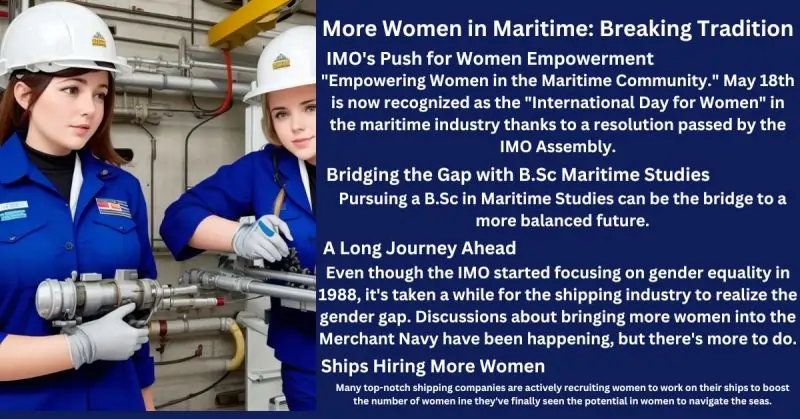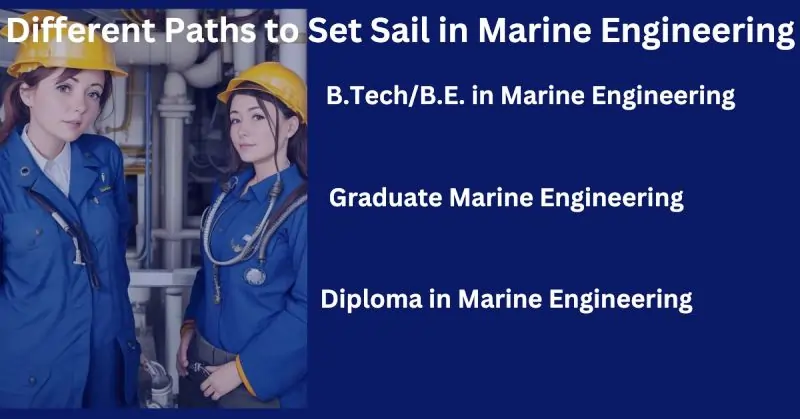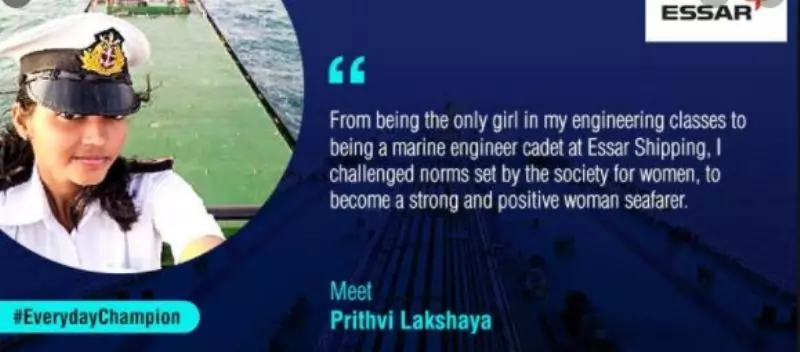Women in Marine Engineering
Have you ever wondered what it takes to conquer the maritime world as a woman? Well, you’re in for a thrilling ride because today, we’re diving headfirst into the exhilarating realm of “Women in Marine Engineering.”
Picture this: a world where massive ships rule the waves, technical wizardry meets the vast ocean, and women are not just navigating but leading the way. It’s like being the captain of your destiny, charting courses through uncharted waters, and making waves of change.
During this journey, I will guide you through the challenges and success in Marine Engineering as your trusted first mate. Together, we’ll explore the depths of opportunities, shatter glass ceilings, and sail toward a future where gender knows no bounds in this seafaring adventure.
So, grab your compass, put on your sailor’s hat, and sail on this inspiring voyage. It’s time to unleash the mariner within and discover the incredible world of “Women in Marine Engineering.” Ready, aye? 🚢🌟 We’ve crafted a step-by-step guide tailored just for you, aspiring women in Marine Engineering.
More Women in Maritime: Breaking Tradition

For years, the Merchant Navy was predominantly a men’s club. But times are changing, and the marine industry is opening its arms to women. According to the International Maritime Organization (IMO), India now has about 1% of the world’s female sailors, or roughly 2% of the total. And guess what? More jobs are now available for women in the maritime.
Approximately 24,059 women are working as seafarers on ships, which is a significant 45.8% increase since 2015. It’s like the industry is finally setting sail towards gender equality.
IMO’s Push for Women Empowerment
The International Maritime Organization (IMO) has a noble goal: to give women in the shipping sector a stronger voice and more opportunities. They’re saying, “Hey, let’s ensure women have an equal chance to shine in this industry! They even dedicated a whole day in 2019 to “Empowering Women in the Maritime Community.” May 18th is now recognized as the “International Day for Women” in the maritime industry thanks to a resolution passed by the IMO Assembly.
Bridging the Gap with B.Sc Maritime Studies
Pursuing a B.Sc in Maritime Studies can be the bridge to a more balanced future.
A Long Journey Ahead
Even though the IMO started focusing on gender equality in 1988, it’s taken a while for the shipping industry to realize the gender gap. Discussions about bringing more women into the Merchant Navy have been happening, but there’s more to do.
Ships Hiring More Women
Many top-notch shipping companies are actively recruiting women to work on their ships to boost the number of women in this industry. It’s like they’ve finally seen the potential in women to navigate the seas.
So, while the journey to equality continues, the maritime world is progressing, and you could be part of this historic change. Join us as we set sail toward a more inclusive and diverse future 🌊⚓🚢
Different Paths to Set Sail in Marine Engineering

Alright, future mariners, let’s explore the routes to become a part of the engineering crew on a ship. There are three main pathways:
1. B.Tech/B.E. in Marine Engineering
Imagine this as the grand entrance to the maritime world. Pursuing a B.Tech or B.E. in Marine Engineering is like earning a captain’s hat. This course gives you all the skills you need for marine engineering.
2. Graduate Marine Engineering
This is like joining the maritime crew with a slightly different ticket. Graduate Marine Engineering is a special course that prepares you for a marine engineering job. It’s like training to become the chief engineer of a ship.
3. Diploma in Marine Engineering
Think of this as a more focused route to get on board. A Diploma in Marine Engineering is like stepping onto the ship with a specific role in mind. It’s a shorter program that teaches you the essentials of marine engineering.
Now, let’s talk about the ship’s “Saloon” department. This part of the ship is responsible for meals and tidying things. While anyone can join, it’s not the most common choice for women. Most shipping companies have been cautious about hiring women in the crew department. So, there might be fewer opportunities here.
However, if you’re determined to work in this division, consider pursuing a GP Rating. It’s like choosing a unique route on the ship’s map.
It might feel strange initially because most of the crew is usually men. But remember, women are known for their mental strength. You’ll adapt to ship life and prove that nothing can stand in your way.
Working on a ship demands mental toughness because you’ll be away from home comforts for months. Traditional social norms and the perception that women are sensitive are reasons women have been discouraged from joining the merchant marine.
While the gender gap is still substantial, many shipping companies are actively working to increase the number of women in their workforce. Young girls aspiring to sail the high seas now have role models in accomplished female marine engineers and deck officers.
So, whether you choose the B.Tech route, graduate studies, or a diploma, remember that the maritime world is evolving, and you have every opportunity to set sail on a rewarding career journey. ⚓🌊🌟
Admission Ahoy! Navigating Marine Engineering Courses
.So, you’re ready to dive into marine engineering, but how do you set sail on this exciting journey? Fear not, matey, I’ve got your back! Let’s break down the procedure to get admission into marine engineering courses.
Step 1: High School Preparation
Before you embark on this adventure, ensure you’ve completed your high school education with a strong foundation in mathematics and science. These subjects are your navigational tools, like plotting a course on a map.
Step 2: Entrance Exams
Many institutions require you to pass an entrance exam. It’s like proving your mettle before boarding a ship. Popular exams include IMU-CET, JEE, and others specific to your region.
Step 3: Choose Your Course
Decide whether you want a bachelor’s or diploma in marine engineering. Think of it as picking the suitable vessel for your voyage.
Step 4: Application Process
Submit your application to the colleges or universities offering marine engineering programs. Include all required documents and fees, similar to purchasing a ticket for your maritime adventure.
Step 5: Counseling and Seat Allotment
Once you qualify, you’ll be invited for counseling sessions. Think of it as your ship’s crew discussing the route. You’ll receive your course and college assignments during this phase.
Step 6: Medical Examination
A medical examination is crucial to ensure you’re fit for sea life. It’s like a health checkup to ensure a safe journey before setting sail.
Step 7: Enrollment and Orientation
Once you’ve completed all the steps, enroll in your chosen institution. The orientation period is like a ship’s safety drill, getting you acquainted with the marine engineering environment.
Remember, every institution may have slight variations in its admission procedures, so it’s essential to check specific requirements for each one. With your compass set and these steps in mind, you’ll soon be on your way to an exciting career in marine engineering. ⚓🌊
Is Marine Engineering Safe for Women? Let’s Find Out!
Hey there, let’s dive right into this critical question: Is a career in marine engineering safe for women? Safety is a big deal in the maritime world, like wearing a life jacket on a boat. So, here’s the scoop on staying safe on this exciting journey:
1. Safety at Sea
Picture this: You’re out at sea, and just like strapping on that life jacket, ships have strict safety rules. They do fire drills, teach you how to handle lifeboats, and more. Why? Because you’re not just along for the ride; you’re a vital part of the crew, and your safety is a top priority.
2. Where You Stay Matters
Your “home” on the ship, which they call cabins, is like your cozy spot in a mountain lodge. These spaces are made to keep you comfy and secure. You’ll have everything you need to feel safe and right at home.
3. Crew Family Vibes
The maritime community is like one big, supportive family. It’s like having a tight-knit group of friends who always have your back. You’ll quickly become part of this awesome network, making your journey safer and more fun.
4. Training Time
Before you set sail, you’ll get some intense training. It’s like gearing up for a significant hike in the wilderness. You’ll learn all about safety drills, first aid, and even how to swim (if you don’t already know). They make sure you’re ready for anything that might come your way.
5. Facing Challenges
Every job has challenges, just like climbing a mountain has those steep climbs. While there might be some challenging moments, the maritime industry is improving. It’s becoming more open and welcoming to women like you. You’re part of a cool new group of pioneers.
So, is marine engineering safe for women? Absolutely! It’s all about embracing the adventure, getting the know-how and skills, and confidently setting sail. The maritime world is shifting, and your journey promises safety and excitement on the high seas. ⚓🌊👩✈️
Setting Sail Towards a Bright Future
What an amazing journey we’ve had exploring the world of Women in Marine Engineering! As we finish, let’s summarize it easily.
1. Embracing Opportunities
We’ve discovered that the maritime world is changing and offering more opportunities for women. Think of it like a ship catching the wind in its sails—women are seizing opportunities in this field, just like finding a chest of treasures.
2. Ready for Success
You are not on this journey alone. You’ll get top-notch training and support like a sports team gearing up for a big game. You’re getting ready to conquer the vast world of marine engineering.
3. Breaking Down Barriers
Like bold explorers venturing into new territories, women are smashing old ideas and setting new paths. The maritime industry now knows that having different kinds of people is a strength, like a team with diverse skills solving tricky puzzles.
4. A World of Dreams
Consider your profession in maritime engineering as a golden passport to exhilarating experiences. It’s like having a pass to the vast oceans and the ability to influence positively a sector that is developing quickly.
The maritime world is ready to welcome you warmly. 🌊⚓🌟
FAQ on ” Women in Marine
Q1: Is marine engineering a male-dominated field?
A1: It used to be, but it’s changing, and more women are joining.
Q2: Are there safety concerns for women in marine engineering?
A2: Safety measures are in place to ensure a secure environment.
Q3: What opportunities are there for women in this industry?
A3: Opportunities are growing in various roles, from engineering to management.
Q4: How can I pursue a career in marine engineering as a woman?
A4: Start by exploring relevant education and training programs.
